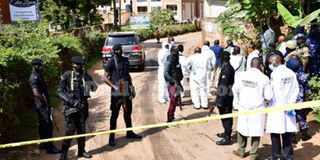Gen Katumba shooting and what happens when elites start losing sleep

Forensic experts and Police officers secure and investigate the crime scene with the car of Uganda's former transport minister General Katumba Wamala in Kampala, Uganda, on June 1, 2021. PHOTO/ABUBAKER LUBOWA
What you need to know:
- Uganda's transport minister, who used to lead the armed forces, was shot Tuesday in an attack which left his daughter and bodyguard dead.
- In the 1970s and 1980s, the Ugandan elites responded to deep fear by aligning with the government in power, maintaining a low profile, or fleeing into exile.
- What complicates the option of exile today is they have built up quite a substantial asset portfolio in the country.
Over the past decade or so, Uganda has become accustomed to the violent deaths of prominent public personalities and high-ranking government officials.
That would take us back to the death in 2009 of the former army commander, Maj Gen James Kazini, and onward to the murder in 2017 of Assistant Inspector General of Police Andrew Kaweesi.
On June 1, Uganda came very close to losing another prominent and popular public figure, the former Chief of Defence Forces, Gen Katumba Wamala, in a shooting in Kisaasi, in Kampala that left his daughter and driver dead.
Given that more than 50 bullets were fired into his SUV, Gen Katumba miraculously got off with two in his arms and nothing more.
Once again, the nation was left shocked. Nothing quite shakes a country than the realisation that nobody is safe and nobody knows who is next.
The sense of security we once felt in building homes surrounded by walls, with rolls of barbed wire running atop the walls and heavy gates, is now gone.
No longer safe
A house with security guards, a high perimeter wall with rolls of barbed wire and CCTV cameras is no longer a place of safety.
High-ranking public officials are now most vulnerable to a gun attack inside their cars and in Kampala’s heavy traffic.
This new method neutralises walls, gates and security lights as a deterrent since today’s gunmen don’t go to prominent people’s homes but attack them where they are most vulnerable in their SUVs, in heavy traffic, in broad daylight.
While politicians and other public figures are given to posturing at every opportunity, the outpouring of sympathy and visits to Gen Wamala in hospital were genuine.
One, because he is one of those public figures popular and respected across the political and social spectrum and two, because the attack on him brought home to everyone just how vulnerable everyone is.
Usually in societies such as Uganda and most other African countries, there is a wide gulf between the tiny elite and the general society.
The elite tend to be indifferent to the circumstances and struggles of the “masses” and only get concerned when their interests and lifestyle are threatened.
Uganda’s political, corporate and business elite is now alert and concerned at the attack on Gen Katumba.
Perhaps the biggest and most credible claim to legitimacy by the NRM government since 1986 has been that it restored peace to Uganda.
This claim is contestable. The northern and north-eastern regions of the country were immediately plunged into instability after the NRM took power.
There have been many murders and unexplained deaths of prominent public figures, starting in 1987 with the murder of the former guerrilla leader Andrew Kayiira.
However, the NRM was able to spin a narrative and create a public and international perception that peace had been ushered across the country after 1986 and remains so.
This perception is starting to get eroded and when the elite in Uganda begin to seriously worry about their personal security, the political mood in the country changes.
Fear sobers us in a way that little else does and fear clearly is setting in among Uganda’s elite.
Their usual complacency and indifference to the news or public affairs is starting to end. They are beginning to think more clearly and urgently. They are starting to question the present political order. They are becoming sceptical.
Deep fear
In the 1970s and 1980s, the Ugandan elite responded to this deep fear by aligning with the government in power, maintaining a low profile, or fleeing into exile.
What complicates the option of exile today is that over the past 30 or so years, this new elite has built up quite a substantial asset portfolio in the country.
They own radio and TV stations, hotels, residential estates, petrol stations, factories, fleets of buses and taxis, large farms, mansions, schools and supermarkets.
It will be difficult for anyone who owns a radio station or shopping mall to ever adapt to living in a two-bedroom flat in London or Boston.
That is partly the reason many NRM Cabinet ministers, Members of Parliament and other government officials will on one hand complain about being humiliated or sidelined by President Museveni or the NRM, but on the other hand they remain in this abusive relationship with the centre of power.
Having gotten used to the easy life of per diem, lead escort cars or impunity that is Uganda today, they cannot enjoy similar perks abroad.
So, something will have to give and that something is that either Museveni gets on top of the security situation and restores a sense of security to the political and business elite or they will be mounting pressure on him to name a successor or initiate a transition of some sort.
Previous cases
2012: Sheikh M. Maganda.
2012: Hussein Jjunju.
2012: Sheikh Abdul Karim.
2012: Abubaker Kiweewa.
2014: Abdul Kadiri Muwaya.
2014: Sheikh Mustafa Bahiga.
2015: Sheikh I. Ssebugwawo.
2015: Sheikh Ibrahim H. Kirya.
2015: Joan Kagezi.
2016: Sheikh Maj M. Kiggundu
2017: AIGP Andrew Kaweesi.
2018: Muhammad Kirumira.
2018: Ibrahim Abiriga.





